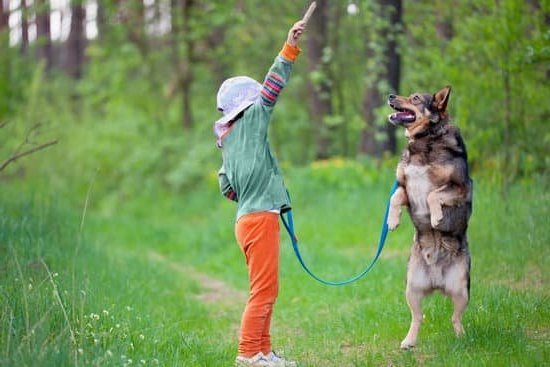One of the most common complaints from dog owners is that their dog barks incessantly when they are on a walk. This can be extremely frustrating, especially if you live in a busy area. Thankfully, there are ways to train your dog not to bark on walks.
The first step is to determine why your dog is barking. There can be many reasons, such as excitement, fear, or aggression. Once you have determined the reason, you can start to work on a solution.
If your dog is barking out of excitement, you will need to work on obedience commands and walking your dog on a leash. Make sure your dog is always responding to your commands, such as “sit” and “stay.” If your dog starts to bark, immediately give the command to “sit” or “stay.” If your dog responds, praise him and continue walking. If your dog does not respond, pull him back to where he is supposed to be and try again.
If your dog is barking out of fear or aggression, you will need to work on obedience commands, as well as desensitization and counterconditioning. Start by teaching your dog basic obedience commands, such as “sit” and “stay.” Once your dog is responding consistently to these commands, you can start to work on desensitization. This involves gradually exposing your dog to the things that scare him or make him aggressive. You will need to start with things that are relatively calm and gradually work your way up to more intense stimuli. Make sure to reward your dog for any progress he makes.
Counterconditioning is the process of teaching your dog to associate something that he fears or dislikes with something that he loves. For example, if your dog is afraid of thunder, you can play a recording of thunderstorm noises while feeding him his favorite treats. Over time, your dog will start to associate the sound of thunder with something positive, and he will no longer be afraid of it.
It is important to be patient and consistent when training your dog not to bark on walks. It may take a little time, but with patience and perseverance, you can get your dog to stop barking.
Dog Training Barking At Door
There can be a variety of reasons why your dog barks incessantly at the door, but the underlying motivation is usually excitement or fear. Dogs may bark when someone comes to the door because they are excited to see them and want to greet them. Alternatively, dogs may bark when someone comes to the door because they are afraid of them and are trying to scare them away.
No matter what the motivation is, it is important to address the problem barking behavior as soon as possible. if your dog is barking out of excitement, you will want to train them to calm down before opening the door. If your dog is barking out of fear, you will want to train them to be more comfortable around strangers.
There are a variety of methods that can be used to address door barking, but the most important part is to be consistent with your training. Make sure to always reward your dog when they are behaving properly and corrected them when they are barking inappropriately. Be patient and keep up with the training, and your dog should eventually learn to stop barking at the door.
Dog Training And Bark Collar
Facts
It is a common misconception that bark collars are cruel and inhumane. The truth is, when used correctly, bark collars are an effective tool for training dogs not to bark excessively.
There are a variety of bark collars available on the market, each with its own unique features. Some bark collars use sound or vibration to interrupt a dog’s barking, while others use a spray of citronella or a burst of air to startle the dog.
One of the most important things to consider when purchasing a bark collar is the size of the dog. Bark collars are available in a variety of sizes to fit dogs of all shapes and sizes.
Another important factor to consider is the temperament of the dog. Some dogs may be too sensitive to certain types of bark collars, while others may not be sensitive enough. It is important to select a bark collar that is appropriate for the individual dog.
Bark collars should only be used as a training tool and should not be left on the dog’s collar permanently. When used correctly, bark collars can be an effective way to train dogs not to bark excessively.
Bark And Birch Dog Training
is a professional dog training company that offers in-home dog training services in the Boston area. We specialize in working with dogs who have behavior problems, and our trainers are experts in dog behavior modification. We also offer group obedience classes, private lessons, and behavior modification classes.
At Bark And Birch Dog Training, we believe that training should be fun for both dog and owner. Our trainers use positive reinforcement methods to train dogs, which means that we reward dogs for good behavior rather than punishing them for bad behavior. This approach is not only more effective, but it is also much more humane.
We offer a variety of services to suit your needs, including in-home training, group obedience classes, private lessons, and behavior modification classes. We also have a wide range of training programs to choose from, including basic obedience, aggression modification, house training, and much more.
If you are looking for a professional dog trainer who can help you correct your dog’s behavior problems, Bark And Birch Dog Training is the perfect choice. We offer a variety of services that are tailored to meet your specific needs, and our trainers are experts in dog behavior modification. Contact us today to learn more about our services or to schedule a free consultation.
How To Train A Dog To Stop Barking At Everything
Barking is a natural behavior for dogs, but sometimes it can be excessive or annoying. If you want to train your dog to stop barking at everything, there are a few things you can do.
First, make sure you are providing your dog with enough exercise. A tired dog is less likely to bark for no reason. You should also make sure your dog is getting enough mental stimulation. Puzzles, treats, and playtime can help keep your dog’s mind active and prevent him from getting bored and barking out of boredom.
If your dog is barking for attention, you should ignore him. Do not give him any attention, even if he is barking aggressively. If you give him the attention he wants, he will only continue to bark.
If your dog is barking because he is anxious or scared, you can try teaching him some basic obedience commands. This will help him feel more confident and in control. You can also try using a positive reinforcement training method, which will reward your dog for good behavior.
If your dog is barking because he is territorial, you can try teaching him to “speak” or “quiet” on cue. This will help you control when and how much your dog is barking. You can also use a bark collar to help train your dog to stop barking.
If you are consistent and patient, you can train your dog to stop barking at everything. It may take some time and effort, but it is definitely worth it in the end.

Welcome to the blog! I am a professional dog trainer and have been working with dogs for many years. In this blog, I will be discussing various topics related to dog training, including tips, tricks, and advice. I hope you find this information helpful and informative. Thanks for reading!





